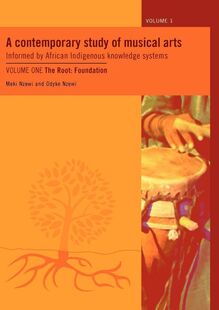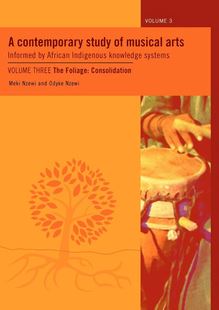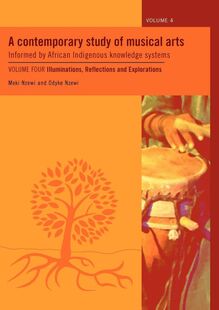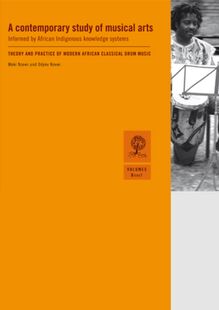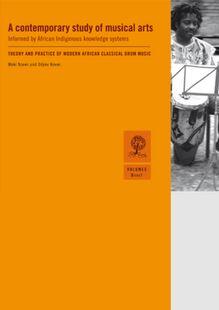-
 Univers
Univers
-
 Ebooks
Ebooks
-
 Livres audio
Livres audio
-
 Presse
Presse
-
 Podcasts
Podcasts
-
 BD
BD
-
 Documents
Documents
-
- Cours
- Révisions
- Ressources pédagogiques
- Sciences de l’éducation
- Manuels scolaires
- Langues
- Travaux de classe
- Annales de BEP
- Etudes supérieures
- Maternelle et primaire
- Fiches de lecture
- Orientation scolaire
- Méthodologie
- Corrigés de devoir
- Annales d’examens et concours
- Annales du bac
- Annales du brevet
- Rapports de stage
La lecture à portée de main
A Contemporary Study of Musical Arts: Informed by African Indigenous Knowledge Systems: Volume 5, Book 2 , livre ebook

Description
Sujets
Informations
| Publié par | African Minds |
| Date de parution | 22 mars 2012 |
| Nombre de lectures | 1 |
| EAN13 | 9781920051679 |
| Langue | English |
| Poids de l'ouvrage | 1 Mo |
Extrait
A CONTEMPORARY STUDY OF MUSICAL ARTS
INFORMED BYAFRICAN INDIGENOUS KNOWLEDGE SYSTEMS
VOLUME 5:THEORY AND PRACTICE OF MODERNAFRICAN CLASSICAL DRUM MUSIC
BOOK 2: CONCERT DUOS(DRUM AND VOICE/WOODWIND/HORNS)
MEKINZEWI& ODYKENZEWI
Ciimda series
A contemporary study of musical arts informed by African indigenous knowledge systems
Volume 5: Theory and practice of modern African classical drum music
Book 2: Concert duos (drum and voice/woodwind/horns)
Authors: Meki Nzewi and Odyke Nzewi
Music typesetting & illustrations: Odyke Nzewi
Reviewer and editor: Christopher Walton
Copy editor: Hester Honey
Music instrument illustrations: Themba Simabine
Proofreading: Chérie M. Vermaak
Book design and typesetting: Simon van Gend
ISBN 978-1-920051-67-9
© 2007 Centre for Indigenous Instrumental African Music and Dance (Ciimda)
First edition, first impression
All rights reserved
Production management: Compress www.compress.co.za
This volume is dedicated to Israel Anyahuru, my mentor,
musical spirit guide and friend. – Meki Nzewi
CONTENTS
A CONTEMPORARY STUDY OF MUSICAL ARTS
FOREWORD
THEORY AND PRACTICE OF MODERN AFRICAN CLASSICAL DRUMMING
T
HE DRUM
THE BELLS
STRING INSTRUMENTS
RATTLES AND SHAKERS
THE FINGER PIANO
PANPIPES
CONCERT,EDUCATION AND HUMANIZING OBJECTIVES–THEORY AND PRACTICE
R
ATIONALIZING ADVANCEMENT
T A
HE PSYCHOLOGICAL BASIS OFFRICAN DRUM ENSEMBLE MUSIC
A
DVANCEMENT INITIATIVES
P
HILOSOPHY AND THEORY OF IDIOMATIC CATEGORIES IN ENSEMBLE MUSIC CREATIVITY
O
BJECTIVES OF MODERN CLASSICAL DRUM MUSIC
ORAL SOLO DRUMMING
ENSEMBLE DRUM MUSIC
C A
LASSROOM EDUCATION IN THEFRICAN MUSICAL ARTS
A
PPLIED DRUM ENSEMBLE PLAYSHOPPING
G
ENERAL
THE WRITTEN CLASSICAL CONCERT GENRE
D
RUM NOTATION
C
LASSICAL DRUMMING EXERCISES
I
IV
1
1
3
3
4
4
4
6
6
6
7
9
10
10
12
12
12
14
16
16
17
CONCERTDUOS(DRUM AND VOICE/WOODWIND/HORNS) 20
T ,A
HE IMPERATIVES OF MELORHYTHMICVOCALIZATION INSTRUMENTATIONAND MOVEMENT INFRICAN MODERN
20
CONCERT VOCAL MUSIC
C 20
ATEGORIES AND STYLES
STYLISTICDETERMINANTS 21
E 21
SSENCE AND NATURE OF MELORHYTHM
I 21
NSTRUMENTS IN VOCAL MUSIC
E –
SSENCE OF MOVEMENTIMPLICATING DANCE
D
RAMATIZED VOCAL MUSIC
D :A ON
RUM DUETCHIENG BYDYKE ZEWI
POEM SONGS WITH VOCALIC LILTING BY MEKI NZEWI
G
RACE OF PENTECOST
YELLOW PETALS
M -M
ARINA ARINA
I
N BETWEEN
SILVER CLOUDS INGARDASEE
L
OVE IS CALLING
TENERIFE
ALP HORN BLUES
D /M N
RUM SAXOPHONE TRUMPET DUOSBY EKIZEWI
V
ALENTINE ON THREE NOTES
V
ALENTINE ON FOUR NOTES
A
KILIKA
KPOM KPOM DUM DUM
T &
HEME CYCLES
W
ERE WERE
O
PINION
22
22
23
32
33
37
47
65
71
80
88
96
107
108
115
120
123
133
143
160
FOREWORD
The inventor of the bomb is idolized, a fantastic human hero
The designer of a wheelchair is taken for granted, another ordinary human
The bomb explodes, killing masses, maiming surviving few
The wheelchair provides human support for the maimed survivors
A sensible human world INDEED!
HUMPH! What has this got to do with the musical arts?
The typical African open-ended membrane drum is your soul mate. It is easy to communicate
and relate to. It tunes your spirit and soothes your moods. It facilitates your bonding
relationship with others. It massages your sensitive organs. It absorbs your strokes, and does not
tell you what you do not want to hear. It regenerates your spiritual wellness and psychical
health.
The drum is a commonly used instrument of musical arts practice all over Africa, which,
over the ages, has captured global attention. The why and how of the African drum and the
epistemology of drum music conceptualizations that compel such fascination, however,
remain insufficiently explored.
There are many indigenous drumming traditions in Africa, and all share common,
fundamental theoretical and technological principles. Every drum type or species, and its ensemble
music theory, serve a specific objective in the culture of origin. The basic theoretical and
scientific principles informing African drum-based music, however, manifest cultural
peculiarities that are environmentally and historically determined. The variations in performance
technique and tonal/sonic manipulation are derived from the technology as well as the sonic
rationalizations that accomplish the utilitarian deployment of a drum or drum music type
in a culture. The more technically and compositionally complex conceptualizations, such as
those for the tuned drum rows –ese,ukomandmgbaof the Igbo of Nigeria (Nzewi, 1977),
theentengaandnamadduof Buganda, Busoga, Bugwere and Langa of Uganda (Wachsmann,
1965) – are rare and not under consideration here, in spite of modern notation symbols and
classical concert compositional idioms having been developed for the Igbo drum row species
(Nzewi, ibid).
The primary commitment during our years of research and advancement studies
regarding African indigenous drum music conceptualizations and practices has been to discern the
common philosophical, theoretical and scientific fundamentals, and to advance these for
contemporary classroom education, modern literary concert performances, specialized
groupor personal-therapy applications and other socialization as well as creative utilizations. We
have designed a modern African classical drumming style that captures and updates the basic
technical, creative and performance principles that underpin various cultural performance
iv
practices and compositional idioms. The theory and technique of modern African classical
drumming thus imparts the generic principles of African drum music creativity, performance
and humanistic deployment. A competent modern classical drummer trained in the written
genre becomes automatically skilled to perform the oral genre, style and type of any
African culture after brief orientation. That is because standard oral procedure is central to our
training in drum literacy skill. A person who has already acquired classical music literacy
can easily acquire the skill to perform music written for the drum or any other indigenous
melorhythmic instrument. On the other hand, a competent performer of any particular style or
type of African drum music cannot perform the written genre or easily perform other cultural
drumming styles without the generic literacy skill having been acquired.
Some indigenous drum music styles and types in Africa are classical in their respective
indigenous philosophical, theoretical and methodological formulations. We use the term
classical in the sense of developing through a systematic approach to creativity that results in
standardized theoretical and performance procedures such as mark indigenous musical arts
types basic to utilitarian intentions. The indigenous conceptual and contextual imperatives
inform the theory of structures and performance practice in the modern classical African drum
music style specifically designed for contemporary contexts of concerts, classroom creativity
1
and performance education, as well as appliedplay-shopping.This volume provides
essential expositions that introduce samples of our modern classical repertory. The philosophical
and theoretical insights will guide a scholar, performer, teacher, learner, general practitioner/
enthusiast or self-therapist who wishes to engage in African drum music practice with
intellectual enlightenment. The discourse that prefaces the written compositions for each of the
three series is virtually the same. Supplementary explication specific to a modern classical
drum music category is provided as appropriate for the particular series. The texts provide
epistemological grounding for cognitively appreciating the indigenous conceptualizations
and configurations that inform the modern classical compositions and contemporary human
applications. Volume 5 Book 3 on intercultural concert ensembles, basic to drum music theory
has an appendix that samples the written testimony of music students brought up in the
European classical music tradition, and who were introduced to African modern classical
drum2
ming in their first year at the Department of Music, University of Pretoria, South Africa.
The written compositions in the three concert categories exemplify the imperative literacy
procedure for contemporary advancement rationalizations. The theoretical procedures and
compositional techniques are therefore markedly African indigenous, and only marginally
derive from any period or style of European classical music theory. The compositions are
grouped for publication in the following three categories:
Volume 5 Book 1 – Drum solos and drummistic piano solos
Volume 5 Book 2 – Concert duos (drum and voice/woodwind/horns)
Volume 5 Book 3 – Intercultural concert ensembles
1
We prefer the term,play-shopto what is commonly termedwork
-
 Univers
Univers
-
 Ebooks
Ebooks
-
 Livres audio
Livres audio
-
 Presse
Presse
-
 Podcasts
Podcasts
-
 BD
BD
-
 Documents
Documents
-
Jeunesse
-
Littérature
-
Ressources professionnelles
-
Santé et bien-être
-
Savoirs
-
Education
-
Loisirs et hobbies
-
Art, musique et cinéma
-
Actualité et débat de société
-
Jeunesse
-
Littérature
-
Ressources professionnelles
-
Santé et bien-être
-
Savoirs
-
Education
-
Loisirs et hobbies
-
Art, musique et cinéma
-
Actualité et débat de société
-
Actualités
-
Lifestyle
-
Presse jeunesse
-
Presse professionnelle
-
Pratique
-
Presse sportive
-
Presse internationale
-
Culture & Médias
-
Action et Aventures
-
Science-fiction et Fantasy
-
Société
-
Jeunesse
-
Littérature
-
Ressources professionnelles
-
Santé et bien-être
-
Savoirs
-
Education
-
Loisirs et hobbies
-
Art, musique et cinéma
-
Actualité et débat de société
- Cours
- Révisions
- Ressources pédagogiques
- Sciences de l’éducation
- Manuels scolaires
- Langues
- Travaux de classe
- Annales de BEP
- Etudes supérieures
- Maternelle et primaire
- Fiches de lecture
- Orientation scolaire
- Méthodologie
- Corrigés de devoir
- Annales d’examens et concours
- Annales du bac
- Annales du brevet
- Rapports de stage
